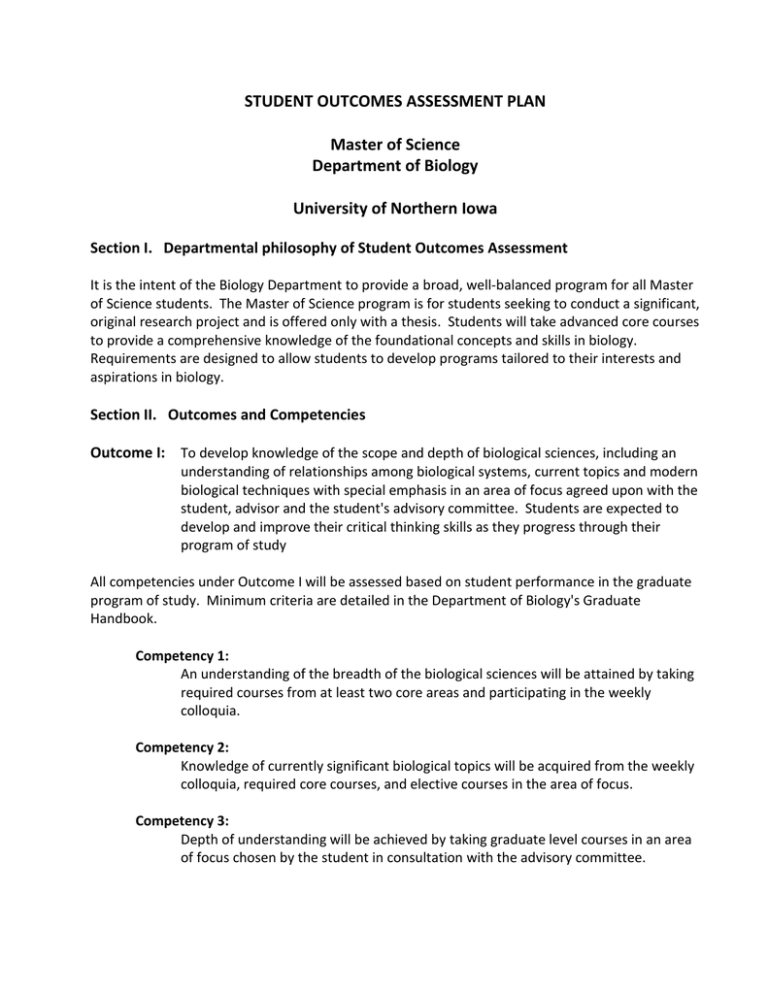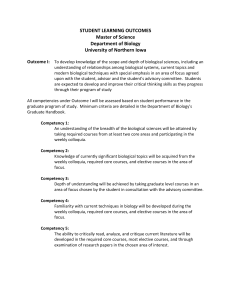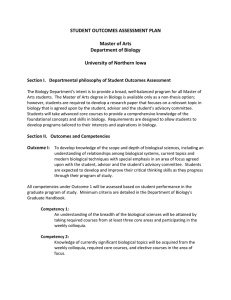STUDENT OUTCOMES ASSESSMENT PLAN Master of Science Department of Biology
advertisement

STUDENT OUTCOMES ASSESSMENT PLAN Master of Science Department of Biology University of Northern Iowa Section I. Departmental philosophy of Student Outcomes Assessment It is the intent of the Biology Department to provide a broad, well-balanced program for all Master of Science students. The Master of Science program is for students seeking to conduct a significant, original research project and is offered only with a thesis. Students will take advanced core courses to provide a comprehensive knowledge of the foundational concepts and skills in biology. Requirements are designed to allow students to develop programs tailored to their interests and aspirations in biology. Section II. Outcomes and Competencies Outcome I: To develop knowledge of the scope and depth of biological sciences, including an understanding of relationships among biological systems, current topics and modern biological techniques with special emphasis in an area of focus agreed upon with the student, advisor and the student's advisory committee. Students are expected to develop and improve their critical thinking skills as they progress through their program of study All competencies under Outcome I will be assessed based on student performance in the graduate program of study. Minimum criteria are detailed in the Department of Biology's Graduate Handbook. Competency 1: An understanding of the breadth of the biological sciences will be attained by taking required courses from at least two core areas and participating in the weekly colloquia. Competency 2: Knowledge of currently significant biological topics will be acquired from the weekly colloquia, required core courses, and elective courses in the area of focus. Competency 3: Depth of understanding will be achieved by taking graduate level courses in an area of focus chosen by the student in consultation with the advisory committee. Competency 4: Familiarity with current techniques in biology will be developed during the weekly colloquia, required core courses, and elective courses in the area of focus. Competency 5: The ability to critically read, analyze, and critique current literature will be developed in the required core courses, most elective courses, and through examination of research papers in the chosen area of interest. Outcome II: Be able to identify and develop a proposal for a significant, original research project. All competencies under Outcome II will be assessed by the student's advisory committee based on a written research proposal as outlined in the Department of Biology's Graduate Handbook. To achieve the competencies listed below, the student will work in consultation with their advisor as well as members of the advisory committee and will utilize the information received in their core and elective courses as needed. Competency 1: Evaluation of the appropriate scientific literature for the proposed project. Competency 2: The ability to identify and define hypotheses that need to be tested. Competency 3: The ability to identify appropriate scientific methods to test the proposed hypothesis. Competency 4: The ability to develop specific experimental designs and statistical analyses suitable to test the proposed hypothesis. Competency 5: To understand how to ascertain necessary resources to carry out the proposed research project (facilities, schedule and budget). Competency 6: The ability to write in a style and format suitable for scientific proposals. Competency 7: The ability to prepare and present an oral scientific research proposal. Outcome III: To be able to conduct a significant, original scientific research project and develop critical analytical skills to analyze experimental data appropriately. All competencies under Outcome III will be assessed (as described in the Department of Biology's Graduate Handbook) by the student's advisory committee based on a thesis that describes the methods and results of the research project and discusses how the current work integrates the results with others in the field. To achieve the competencies listed below, the student will work in consultation with their advisor as well as members of the advisory committee and will utilize the information received in their core and elective courses as needed. Competency 1: Expertise in using necessary equipment and working out appropriate project logistics. Competency 2: The ability to gather data appropriate for testing proposed hypotheses. Competency 3: The ability to analyze data by quantitative or qualitative methods to test the proposed hypotheses. Competency 4: The ability to interpret and present results from data analyses. Competency 5: The ability to generate appropriate conclusions based on new and/or existing data and to put the results into context with the current scientific literature. Competency 6: The ability to write in a style and format suitable for scientific publication. Competency 7: The ability to prepare, deliver and defend their research during an oral scientific presentation of the work. Section III. Frequency of Assessments Master of Science students will be assessed at various points in the program: 1) 2) 3) 4) 5) at entry into the program, during the advisory committee's consideration of the thesis proposal, during the third semester of the student’s program, during evaluation of the research project and oral defense, following graduation. Section IV. Methods of Assessment for Outcomes and Competencies 1) At entry into the program, Students are accepted into the program based on compatibility of research interests with faculty, transcripts and letters of reference to identify strengths and possible weaknesses in the basic sciences (e.g., lack of appropriate course work and low grades in relevant courses). Any deficiencies will be rectified by adding appropriate courses to the program of study. At the beginning of the first semester, a portfolio based assessment plan will be introduced by the student’s advisor. The advisor will explain the purpose of the assessment portfolio, its intended contents, and the process by which it will be reviewed. The portfolio is used as a means to assess the MS Biology graduate program in the long term. The student is expected to add to the file for the duration of their program. The file should include representative works from their core and/or elective courses, (e.g. research papers, lab reports, article reviews, class presentations), a copy of their program of study, the initial research proposal, a mid-progress report, any presentations made at scientific meetings, the final public presentation of the thesis research as well as the thesis. 2) During the advisory committee’s consideration of the thesis proposal. Following the formation of the student’s graduate advisory committee, the quality of the thesis proposal will be assessed based on a presentation given by the student at Colloquium in the first semester or the beginning of the second semester. 3) During the third semester (following acceptance into the program) of the student’s degree program. The student and their advisory committee will meet to discuss the progress the student has made towards completion. Suggestions or any requirements for completion should be made to the student and advisor by the members of the advisory committee. 4) During evaluation of the research project and oral defense. The student’s advisory committee will assess if the student has successfully completed the thesis research, and adequately defended the research at a seminar open to all interested parties. 5) Following graduation. After graduation, graduates will be contacted to assess the adequacy of our program in preparing students for futures in biology. Section V. Analysis-Interpretation and Reporting of Results Files that document academic progress will be retained in the Biology department office. This file will consist of student’s initial (complete) application for graduate study as well as transcripts, program of study, degree audits from their current degree. The student will be responsible for maintaining a portfolio/file of their academic progress. This portfolio will include a representative sample of the student’s work from core and/or elective courses, a copy of the program of study, the initial research proposal, a mid-progress report, any presentations made at scientific meetings, the final public presentation of the thesis research as well as the thesis. The portfolio can be used by the student’s advisory committee to evaluate the student’s progress towards the completion of their program of study and research paper. After graduation of the student, portfolios/files will be maintained in a centralized, accessible space where the department’s Outcomes Assessment Committee will periodically review them to assess if MS students are meeting the outcomes and competencies outlined in the Outcomes Assessment plan. They may also evaluate feedback from former students about the program's adequacy in preparing them for careers in biology and make recommendations for any necessary changes. All potential program modifications will be reviewed by the entire biology faculty and any changes will be forwarded to the Graduate Committee.


